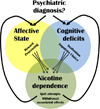Negative affective states and cognitive impairments in nicotine dependence
- PMID: 26054790
- PMCID: PMC4670824
- DOI: 10.1016/j.neubiorev.2015.06.004
Negative affective states and cognitive impairments in nicotine dependence
Abstract
Smokers have substantial individual differences in quit success in response to current treatments for nicotine dependence. This observation may suggest that different underlying motivations for continued tobacco use across individuals and nicotine cessation may require different treatments in different individuals. Although most animal models of nicotine dependence emphasize the positive reinforcing effects of nicotine as the major motivational force behind nicotine use, smokers generally report that other consequences of nicotine use, including the ability of nicotine to alleviate negative affective states or cognitive impairments, as reasons for continued smoking. These states could result from nicotine withdrawal, but also may be associated with premorbid differences in affective and/or cognitive function. Effects of nicotine on cognition and affect may alleviate these impairments regardless of their premorbid or postmorbid origin (e.g., before or after the development of nicotine dependence). The ability of nicotine to alleviate these symptoms would thus negatively reinforce behavior, and thus maintain subsequent nicotine use, contributing to the initiation of smoking, the progression to dependence and relapse during quit attempts. The human and animal studies reviewed here support the idea that self-medication for pre-morbid and withdrawal-induced impairments may be more important factors in nicotine addiction and relapse than has been previously appreciated in preclinical research into nicotine dependence. Given the diverse beneficial effects of nicotine under these conditions, individuals might smoke for quite different reasons. This review suggests that inter-individual differences in the diverse effects of nicotine associated with self-medication and negative reinforcement are an important consideration in studies attempting to understand the causes of nicotine addiction, as well as in the development of effective, individualized nicotine cessation treatments.
Keywords: Cognitive impairment; Negative affect; Negative reinforcement; Nicotine.
Copyright © 2015 Elsevier Ltd. All rights reserved.
Figures


References
-
- Abreu-Villaca Y, Queiroz-Gomes Fdo E, Dal Monte AP, Filgueiras CC, Manhaes AC. Individual differences in novelty-seeking behavior but not in anxiety response to a new environment can predict nicotine consumption in adolescent C57BL/6 mice. Behav Brain Res. 2006;167:175–182. - PubMed
-
- Adler LE, Hoffer LD, Wiser A, Freedman R. Normalization of auditory physiology by cigarette smoking in schizophrenic patients. Am J Psychiatry. 1993;150:1856–1861. - PubMed
-
- Adriani W, Granstrem O, Macri S, Izykenova G, Dambinova S, Laviola G. Behavioral and neurochemical vulnerability during adolescence in mice: studies with nicotine. Neuropsychopharmacol. 2004;29:869–878. - PubMed
-
- Allison C, Shoaib M. Nicotine improves performance in an attentional set shifting task in rats. Neuropharmacology. 2013;64:314–320. - PubMed
Publication types
MeSH terms
Grants and funding
LinkOut - more resources
Full Text Sources
Other Literature Sources
Medical

